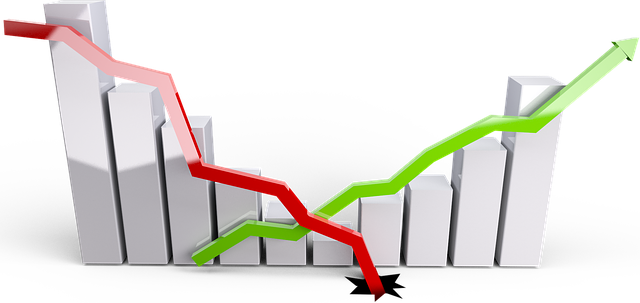Markets always experience volatile periods. Exponential growth doesn’t remain consistent in the markets forever. Eventually, economic downturns or changes in consumer behavior will lead to drastic swings in the investing world.
Firms and their clients must stay on course and stay calm. As a firm owner, whether or not you provide financial planning services, it’s important to be educated on how to handle volatile markets.
Everyone gets intimidated and worried during volatile times, even after years of experience. However, it’s essential to follow tried and true tips to stay on track during these times.
Why You Must Stay Course During Volatile Times
Staying the course is crucial for investors, and a prime example of this is the market hitting bottom on March 23, 2020. A $1 million portfolio at this time would have fallen to near $800,000 at this point.[1]
Many people readjusted and went 100% cash or 100% bonds.
However, a 50%/50% portfolio split evenly between stocks and bonds would have risen over 8% by March 2022, while cash fell by 17% and bonds by 22% during this period.
Staying course led to investors experiencing 8% growth. Although bonds did not perform well (and active portfolio management can certainly help reduce the risk of losses), simply staying on course provided much better returns than exiting the markets.
Even during the most substantial crashes, there’s a light at the end of the tunnel: recovery.
For example, when markets crashed in 2008:
- People lost a lot of money and exited the markets
- Others remained in the market
- Market-remainers saw a 178% return in the S&P 500 by 2013[2]
Volatile markets are an opportunity and will turn around if your clients stay the course. Calming emotions and explaining how volatility works are crucial when dealing with clients. It’s natural to be concerned when investment portfolios start receding from highs.
However, history shows us that when the markets are volatile and even crash, growth will eventually return. Often, the growth is rapid and long-lasting.
3 Tips to Manage Volatile Markets
Managing volatility requires you to know history and really keep perspective. A few tips that can help are:
1. Remember: Downturns Happen
Traditionally, since 1926, markets have gone into bear territory every six years. The losses during these downturns averaged 20% – 40%.[3] In more recent years, the S&P 500 has gone into bear territory when:
- Dot-com bubble occurred
- 9/11
- Iraq War
- 2008 financial crisis
- Sovereign debt crisis
- Brexit
- Coronavirus
All of these periods have happened since 2000. After all of these downturns, there has been growth afterward, and markets continued to reach all-time highs. If you do one thing, remember that downturns naturally occur, and they are followed by periods of recovery.
2. Choose an Investment Plan Wisely
If you’re currently helping your clients with financial planning, you’ll want to make sure you’re considering the right investment mix. Investing in the market to achieve aggressive growth may provide the best annual return, but it will also often lead to higher volatility. You should consider the right investment mix, which may be:
- Conservative, with 50% bonds and the rest short-term investments, US and foreign stock.
- Balanced, with 40% bonds, 35% US stock, and the rest mixed between foreign stock and short-term investments.
- Growth, where 49% of a portfolio is in US stocks, 25% in bonds, and the rest in foreign stock and short-term investments.
Aggressive growth portfolios eliminate bonds and put more than 50% of investments in US stocks.
3. Continue to Invest Consistently
If you can time the market with 100% precision, removing money from the market and then reinvesting right before an upturn would yield the best results. However, no one can time the market with a high level of accuracy.
It’s better to invest consistently, even during volatile times, because history shows us that:
- One year after a recession, growth periods are often high
- Investors can purchase stocks when they’re at their cheapest
Growth can only happen when you’re actively investing.
Volatile markets happen. The world’s most respected investors and investment firms can’t predict the market with 100% certainty. However, they can control how they react to the volatile market, and this means readjusting and staying on course.
You may rebalance portfolios and try to limit risk exposure, but exiting the market shouldn’t be a long-term strategy.
Instead, if you’re offering your clients financial planning services, encourage them to stay the course, keep investing, and when the volatility clears, they’ll be far ahead of others who got the jitters and exited the markets. History repeats itself. And historically, even after a major market crashed, growth was on the other side, waiting to push markets back to previous highs and often beyond.
======
Joseph Graziano, CFP® is the Vice President and Wealth Management Partner at FFP Wealth Management. Through FFP management, Joe and his team help manage over 2.4 billion in assets. FFP Wealth Management has served the unique needs of the accounting community for over 28 years and was formed out of dire need for accountants and financial planners to join forces in providing premium services to their clients. If you’re thinking about selling your firm but aren’t 100% sure if now is the right time, schedule a discovery call with FFP Advisors Joseph Graziano today.
[1] https://advisors.vanguard.com/insights/article/managingmarketvolatilityforyourclientsandyourpractice
[2] Zweig, Jason, et al. “Lessons from the Bull Market.” The Wall Street Journal, Dow Jones & Company, 7 Mar. 2014, https://www.wsj.com/articles/lessons-from-the-bull-market-1394232941.
[3] “What to know as S&P 500 enters bear market territory: ‘The bottom line is, it’s a tough time,’ says financial advisor.” CNBC, 14 June 2022, https://www.cnbc.com/2022/06/14/the-sp-500-closed-in-a-bear-market-on-monday-what-does-that-mean.html. Accessed 1 August 2022.
Thanks for reading CPA Practice Advisor!
Subscribe Already registered? Log In
Need more information? Read the FAQs
Tags: Firm Management




